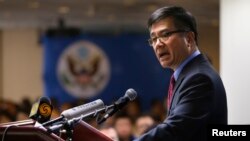Outgoing U.S. Ambassador to China Gary Locke used his final speech in office Wednesday to urge Beijing to strengthen its rule of law and provide greater freedom of expression.
Speaking to a group of Chinese university students in Beijing, Locke said in many cases China would need only to adhere to its existing laws in order to protect fundamental human rights.
"China has a great future ahead of it. But reaching its full potential will depend on a neutral and respected judiciary, an active set of dedicated lawyers, wise leadership, but most of all, reverence toward the rule of law. It will depend on respect for the constitutionally guaranteed freedom of speech for all, an open Internet, a well-informed citizenry willing to engage in unrestricted dialogue on how best to build a stable and progressive future for China," said Locke.
The 63-year-old Locke leaves Beijing Saturday. He has served as ambassador since 2011, filling one of America's most complicated diplomatic posts at a time of increased tension with Beijing.
Many of Locke's comments Wednesday focused on U.S. concerns over China's intensifying crackdown on those who criticize the Communist Party.
"The U.S. is deeply concerned over the recent pattern of harassment, arrests, prosecutions of good government advocates, of public interest lawyers, of activists, Internet journalists, religious leaders, and even others in China. The United States calls on China to guarantee peaceful activists the protections and freedoms to which they're entitled under China's international human rights commitments," said Locke.
He also urged Beijing to provide "better and more equitable treatment" of foreign journalists, many of whom complain of interference or official retribution as result of their coverage.
China's foreign ministry spokeswoman, Hua Chunying, responded to Locke's comments by saying that Chinese citizens enjoy "unprecedented rights and freedoms."
"China has achieved huge progress that has attracted the world's attention since the implementation of reform and opening up policy in more than 30 years. Citizens have enjoyed unprecedented rights and freedoms, which is an objective fact that cannot be denied by anyone. We are willing, on the basis of equality and mutual respect, to have dialogue and exchanges with other countries for joint progress. But we firmly oppose any person using these so-called issues to interfere in China's internal affairs and make thoughtless remarks and criticize summarily on China's internal issues," said Hua.
Locke is the first Chinese-American to serve as the U.S. ambassador to Beijing. He often drew headlines in China for his relatively humble demeanor, which stood in contrast to the lavish lifestyle of many Chinese leaders
He is being replaced by veteran lawmaker Max Baucus. The 72-year-old senator from the northwestern state of Montana has limited China experience, but a record of taking a tough stance on controversial Chinese trade practices.
Speaking to a group of Chinese university students in Beijing, Locke said in many cases China would need only to adhere to its existing laws in order to protect fundamental human rights.
"China has a great future ahead of it. But reaching its full potential will depend on a neutral and respected judiciary, an active set of dedicated lawyers, wise leadership, but most of all, reverence toward the rule of law. It will depend on respect for the constitutionally guaranteed freedom of speech for all, an open Internet, a well-informed citizenry willing to engage in unrestricted dialogue on how best to build a stable and progressive future for China," said Locke.
The 63-year-old Locke leaves Beijing Saturday. He has served as ambassador since 2011, filling one of America's most complicated diplomatic posts at a time of increased tension with Beijing.
Many of Locke's comments Wednesday focused on U.S. concerns over China's intensifying crackdown on those who criticize the Communist Party.
"The U.S. is deeply concerned over the recent pattern of harassment, arrests, prosecutions of good government advocates, of public interest lawyers, of activists, Internet journalists, religious leaders, and even others in China. The United States calls on China to guarantee peaceful activists the protections and freedoms to which they're entitled under China's international human rights commitments," said Locke.
He also urged Beijing to provide "better and more equitable treatment" of foreign journalists, many of whom complain of interference or official retribution as result of their coverage.
China's foreign ministry spokeswoman, Hua Chunying, responded to Locke's comments by saying that Chinese citizens enjoy "unprecedented rights and freedoms."
"China has achieved huge progress that has attracted the world's attention since the implementation of reform and opening up policy in more than 30 years. Citizens have enjoyed unprecedented rights and freedoms, which is an objective fact that cannot be denied by anyone. We are willing, on the basis of equality and mutual respect, to have dialogue and exchanges with other countries for joint progress. But we firmly oppose any person using these so-called issues to interfere in China's internal affairs and make thoughtless remarks and criticize summarily on China's internal issues," said Hua.
Locke is the first Chinese-American to serve as the U.S. ambassador to Beijing. He often drew headlines in China for his relatively humble demeanor, which stood in contrast to the lavish lifestyle of many Chinese leaders
He is being replaced by veteran lawmaker Max Baucus. The 72-year-old senator from the northwestern state of Montana has limited China experience, but a record of taking a tough stance on controversial Chinese trade practices.




